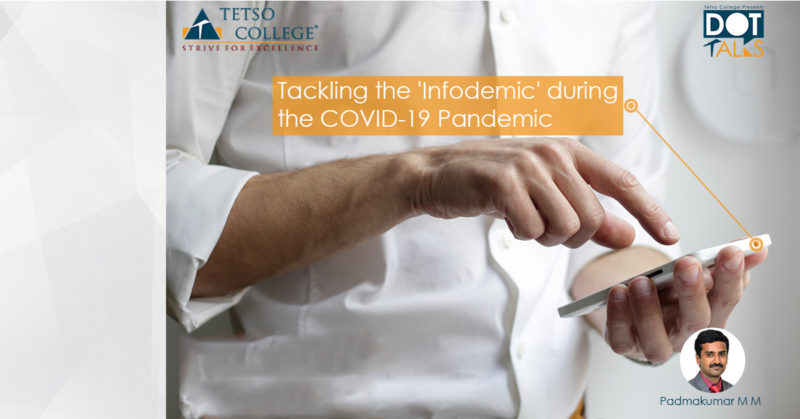In India, where our society rests on a tumultuous balance of communal harmony and dissent, an infodemic of misinformation can and has wreaked havoc during the COVID-19 period. From people misinterpreting facts and maliciously spreading communal hatred, to actively participating in the dissemination of unverified and sensationalized news content and information, we have been lashed by waves of constructed truths.
The DOT Talks Webinar Series with Padmakumar M M, Head of the Department of Media Studies at Christ (Deemed to be University) delved into this issue and sought to critique this infodemic of misinformation prevalent during this pandemic.
The resource speaker began by sharing the premise on which our present information ecosystem is set up which is the huge volume of information we get access to and the amount which we consume on a daily basis. This can be established by the fact that 50,000 Google searches are made per minute while 500 hours of videos are uploaded on YouTube every minute, he added. He also spoke on the information-news relationship and said that all information cannot be classified as news. However, Padmakumar pointed out that while there is so much of data, the authenticity of it all is something that becomes questionable.
Referring to Edward S. Herman and Noam Chomsky’s Manufacturing Consent: The Political Economy of the Mass Media, the speaker briefly reiterated the five filters to the media which are media ownership, funding, sourcing, flak, and common enemy, before adding that these factors play an important role in disseminating the news as we know it. He also briefly explained the differences between disinformation, misinformation, and malinformation.
Drawing comparison to the term pandemic, the speaker further elaborated on how an infodemic is spread which unlike legacy media that depend on fact-checking mechanisms to verify content before circulating any kind of information, the new-age social media can be accessed and created by anyone and without any verification process involved.
Therefore, he urged that as both consumers and producers of information, the key thing that needs to be done in this challenging context is to resist that urge to share and choose to verify what we put out there in any media platform.

